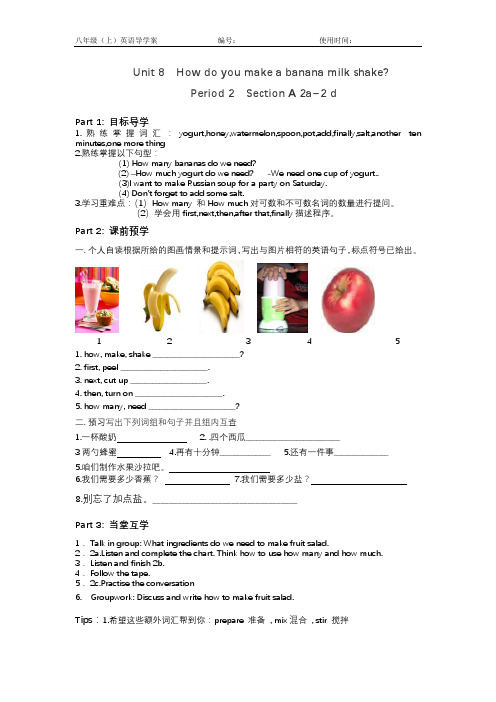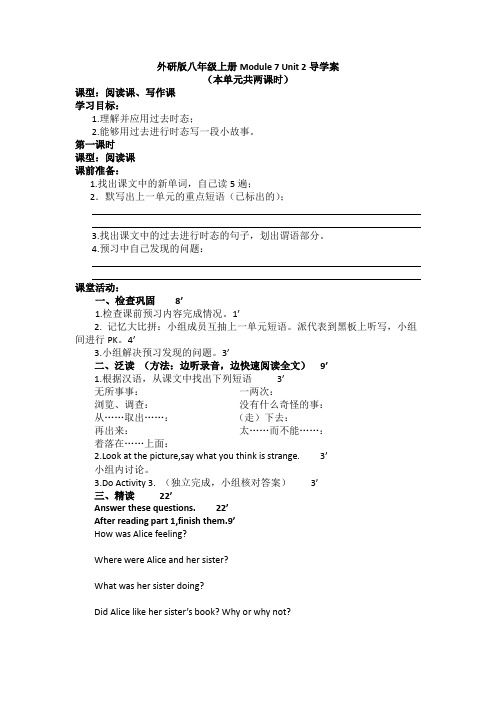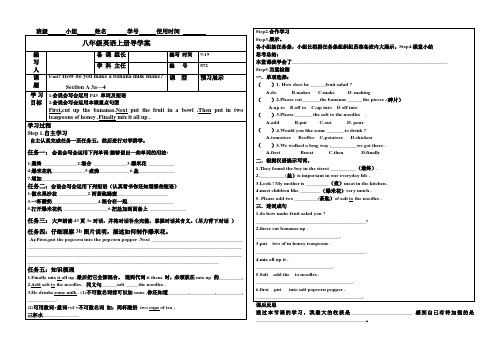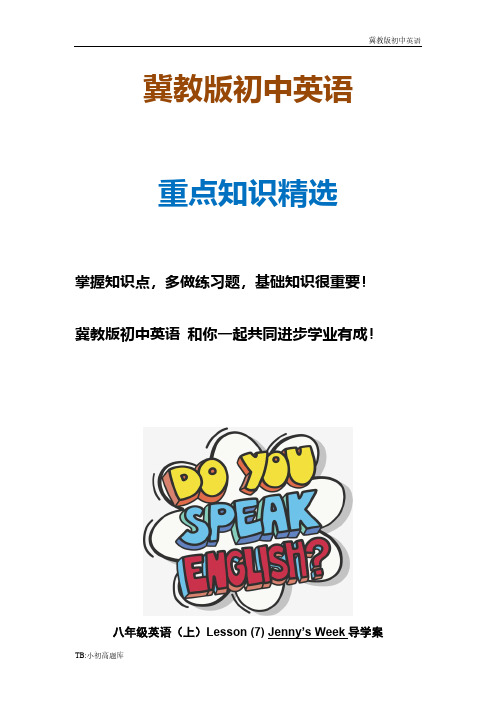2019年秋八年级上册导学案Unit 7 第2课时
- 格式:doc
- 大小:53.06 KB
- 文档页数:5


Unit 8 How do you make a banana milk shake?Period 2 Section A 2a~2 dPart 1: 目标导学1.熟练掌握词汇:yogurt,honey,watermelon,spoon,pot,add,finally,salt,another ten minutes,one more thing2.熟练掌握以下句型:(1) How many bananas do we need?(2) –How much yogurt do we need? -We need one cup of yogurt..(3)I want to make Russian soup for a party on Saturday.(4) Don’t forget to add some salt.3.学习重难点:(1)How many 和How much对可数和不可数名词的数量进行提问。
(2)学会用first,next,then,after that,finally描述程序。
Part 2: 课前预学一.个人自读根据所给的图画情景和提示词,写出与图片相符的英语句子,标点符号已给出。
1 2 3 4 51. how, make, shake ________________________?2. first, peel ________________________.3. next, cut up _____________________.4. then, turn on ________________________.5. how many, need ________________________?二.预习写出下列词组和句子并且组内互查1.一杯酸奶2. .四个西瓜__________________________3两勺蜂蜜 4.再有十分钟______________ 5.还有一件事_______________5.咱们制作水果沙拉吧。

外研版八年级上册Module 7 Unit 2导学案(本单元共两课时)课型:阅读课、写作课学习目标:1.理解并应用过去时态;2.能够用过去进行时态写一段小故事。
第一课时课型:阅读课课前准备:1.找出课文中的新单词,自己读5遍;2.默写出上一单元的重点短语(已标出的);3.找出课文中的过去进行时态的句子,划出谓语部分。
4.预习中自己发现的问题:课堂活动:一、检查巩固8’1.检查课前预习内容完成情况。
1’2. 记忆大比拼:小组成员互抽上一单元短语。
派代表到黑板上听写,小组间进行PK。
4’3.小组解决预习发现的问题。
3’二、泛读(方法:边听录音,边快速阅读全文)9’1.根据汉语,从课文中找出下列短语3’无所事事:一两次:浏览、调查:没有什么奇怪的事:从……取出……:(走)下去:再出来:太……而不能……:着落在……上面:2.Look at the picture,say what you think is strange. 3’小组内讨论。
3.Do Activity 3. (独立完成,小组核对答案)3’三、精读22’Answer these questions. 22’After reading part 1,finish them.9’How was Alice feeling?Where were Alice and her sister?What was her sister doing?Did Alice like her sister’s book? Why or why not?What was Alice thinking of doing?What color were the rabbit’s eyes?After reading part 2,finish them:8’What did the rabbit say?What did the rabbit do with its watch?Where was the rabbit’s watch before he took it out?Why did Alice get up?What did Alice run across after the rabbit?After reading part3,finish them:5’What did Alice fall down?Did Alice know how to get out again?Where did Alice land?五、课堂练习6’根据句意及首字母写出相应的单词。

班级小组姓名学号使用时间八年级英语上册导学案编写人备课组长编写时间9.19 学科主任编号872课题Unit7 How do you make a banana milk shake?Section A 3a—4课型预习展示学习目标1.会说会写会运用P43 单词及短语2.会说会写会运用本课重点句型First,cut up the bananas.Next put the fruit in a bowl .Then put in two teaspoons of honey .Finally mix it all up .学习过程Step 1.自主学习自主认真完成任务一至任务五,然后进行对学群学。
任务一:会说会写会运用下列单词(能够说出一些单词的用法)1.最终_____________2.混合_____________3.爆米花__________4.爆米花机_____________5.煮沸____________6.盐______________7.增加_______________任务二:会说会写会运用下列短语(认真看书你还知道哪些短语)1.做水果沙拉___________2.两茶匙蜂蜜____________________3.一杯酸奶__________________4.混合在一起__________________5.打开爆米花机_________________6.把盐加到面条上______________任务三:大声朗读43页3a对话,并将对话补全完整,掌握对话其含义。
(尽力背下对话)任务四:仔细观察3b图片说明,描述如何制作爆米花。
A:First,put the popcorn into the popcorn popper .Next ____________________________________ ____________________________________________________________________________________ ____________________________________________________________________________________ ___________________________________________________________________________任务五:知识梳理1.Finally mix it all up .最后把它全部混合。

人教版八上英语unit7教案和导学案Unit 7教案Unit 7: An Ideal Summer CampObjectives:1. Understand and use Summer Camp vocabulary.2. Describe activities in a summer camp.3. Give suggestions and opinions about a summer camp.4. Write a blog post about an ideal summer camp.Language Objectives:1. Vocabulary: summer camp, hiking, swimming, canoeing, horseback riding, archery, rock climbing, campfire, tent.2. Grammar: Use of modals to give suggestions and opinions.3. Writing: Write a blog post about an ideal summer camp.Warm-up:- Begin the lesson by showing pictures of different summer camp activities. Ask students to describe the activities in the pictures.- Discuss with students what they know about summer camps and what they like to do in the summer.Introduction:- Introduce the vocabulary for this unit. Practice pronunciation and usage with students.- Introduce the grammar point of using modals to give suggestions and opinions.Listening:- Play a recording of a conversation between two students talking about their experiences at a summer camp. Ask students to listen for the activities they did and write them down.Speaking:- Pair students up and have them discuss what they would like to do at a summer camp. Encourage them to use modals to give suggestions and opinions.Reading:- Have students read a passage about an ideal summer camp. Ask comprehension questions to check understanding.Writing:- In groups, have students brainstorm ideas for their own ideal summer camp. They should write a blog post describing their camp, including activities and facilities.Homework:- Assign students to write a diary entry about a day at their ideal summer camp.- Study vocabulary and practice using modals to give suggestions and opinions.Unit 7导学案Unit 7: An Ideal Summer CampVocabulary:- Summer camp: a place where children go during the summer to participate in outdoor activities.- Hiking: the activity of walking in the countryside for pleasure.- Swimming: the sport or activity of moving through water by moving one's arms and legs.- Canoeing: the sport or activity of traveling in a canoe.- Horseback riding: the sport or activity of riding horses.- Archery: the sport or skill of shooting arrows from a bow.- Rock climbing: the sport or activity of climbing rocks or walls using ropes and other equipment.- Campfire: a fire at a campsite, used for cooking, warmth, and socializing.- Tent: a portable shelter made of cloth or other material supported by poles and stretched tight by ropes.Grammar:- Modals: can, could, should, would, might, may- Use modals to give suggestions and opinions. Example: You should try horseback riding. It's a lot of fun.Reading:- Read the passage about an ideal summer camp and answer the following questions:1. What activities are available at the camp?2. What facilities does the camp have?3. Why does the writer think it is an ideal summer camp?Writing:- Write a blog post about your ideal summer camp. Describe the activities, facilities, and why you think it would be a great place to spend the summer.Speaking:- Practice giving suggestions and opinions using modals. Discuss with a partner what activities you would like to do at a summer camp and why.Homework:- Write a diary entry about a day at your ideal summer camp.- Study vocabulary and review using modals to give suggestions and opinions.。

冀教版初中英语重点知识精选掌握知识点,多做练习题,基础知识很重要!冀教版初中英语和你一起共同进步学业有成!八年级英语(上)Lesson (7) Jenny’s Week导学案Designer:He Baoxia Guidance Teacher:reviewer:Class Grade Eight Learner(s):Date:【Learning aims】Learn this lesson, master the focus words” name ,later, invite, parent” and use them, then learn English diary, to improve students' English ability to apply what they have learned.【Important difficulties in Learning】Master the focus words“name ,later, invite, parent”and use them, then learn English diary to improve students' English.【Autonomous learning】1.掌握词语词组:命名,给·····取名_________, 后来;过一会_______邀请(动词)___ ____, 日记__________父亲或母亲_______,父母亲(双亲)____介绍___________2、找出并翻译下列句子:(1).丹尼给他的新朋友介绍我们。
________________________________________________________ (2)我讨厌失败.__________________________________________________________ (3)上周六,我妈妈给我买了一条牛仔。
人教版新目标八年级英语上册Unit 7 导学案课题:Unit 7 A1 课型:New 课时数:2课时班级: 姓名:【教学目标】Make predictions【德育目标】Understanding the cultural differences of China and the West.【重点难点】Future with will; quantities with more, less, fewer【教学过程】二次备课预习指导:I. 默写下列单词1.纸_________2.污染___________3.预言_________4.未来_________5.污染_________6.环境___________7.行星_________8.地球_________9.植物_________ 10.部分_________ 11.参与_________ _____ _________12.和平________ 13.海______ 14.建造________ (pt.)________ 15.天空______II. 预习并写出下列词组1.在电脑上__________________2.在人们的家里_____________________3.每家_____________4.活到200岁_______________________________5.100年之后_________________6.更多的污染____________________7.在纸上____________ 8.免费___________ 9.庞大而拥挤________________10.处于危险中_____________ 11.住在地球上_________________________12.参与_______________ 13.搬到其他星球上__________________________14.世界和平________________ 15.种更多的树_______________________当堂训练:I. 句型转换1. People will have robots in their homes.否定句:______________________________________________一般疑问句:______________________________________________2. He will go to the park with his friends.否定句:______________________________________________一般疑问句:______________________________________________3. There will be a party tonight.否定句:______________________________________________人教版新目标八年级英语上册Unit 7 导学案课题:Unit 7 A2 课型:New 课时数:2课时班级: 姓名:【教学目标】Make predictions【德育目标】Understanding the cultural differences of China and the West.【重点难点】Future with will; quantities with more, less, fewer【教学过程】二次备课预习指导:I. 背Grammar focus 并写出下列句子1.城市将会是什么样子?城市将受到更多污染并且有更少的树。
八年级英语上册Unit7导学案八年级(上)英语学科导学案Unit7Hduaeabananailshae?SetinA1a-2教师寄语:Dn'tputfftilltrrhatshuldbednetda今日事,今日毕。
一、复习检测:Translatethefllingphrases)喝奶昔_________2)把牛奶倒进搅拌器里__________________3)剥香蕉_______________4)切碎_________)打开_____________6)关上____________________7)做水果沙拉_____________8)多少酸奶__________9)把…加到…上…____________10)煮面条___________二、学习目标:、熟悉本节出现的生词短语。
2、Desribeapress3、Fllinstrutin4、提高听力技能。
三、自学导航:)词汇:、切,割2、材料3、黄油4、剥,削、茶匙6、西瓜2)阅读听力原文,理解大意,为上练习听力做好准备。
四、展示交流:1、小组交流自学导航的自学成果,教师巡回指导。
(建议学生板书)2、小组交流如何制作香蕉奶昔。
A:Hduaeabananailshae?B:Peelthebananas…知识点:短语:)把水果放进碗里2)两勺蜂蜜3)混合4)把材料放到面条上)打开棒花机6)倒入7)一茶杯酸奶五、学海探究:实际练习做香蕉奶昔六、写作练习。
你怎么做香蕉奶昔?请你写出过程。
六、中考连接:____thselights,pleaseDn’tusesuhenerg ATaeffBPutnTurnffDTurnn七、反思总结:我的收获:__________________________英语学科导学案Unit7 Hduaeabananailshae?一、学习目标:<1>Desribeapress <2>Fllinstrutins二、重点难点:1、nthetpfatthetpf2、areipefr…3、tastedeliius4、enughtd ntenughtdsth、needtdsth三、知识链接:、Putthetat thebreadA.inB、n、fr2、Finall, putt frelishnthetureA、teaspnB、teaspns、teaspnes3、eneedthree4、ulduplease eithEnglish?、Heisldenugh tshl6、Here’sareipe agreatturesandih7、anugiveeapple?8、Heatet四、基础知识:、anther的用法2、ntpfatthetpf3、areipefr…4、taste+ad、enughtd6、ulduplease+V原…?uldupleasentdsth…? tsliesfbread7、slie片threesliesfhien (slies)putnanthersliefbread 8teaspn①ateaspnfbutter茶匙②tteaspnsfrelish(teaspns)③puttteaspnsfrelishntheture 五、能力训练:riting:1、SuperhienSandih超级鸡肉三明治2、Areipefragreatturesandih3、HteatBeiingDu作业布置:、作文:HteatBeiingDu2、背诵:Htaethesuperhiensandih。
Unit 7 Will people have robots ?SectionA(2a-2c) 第二课时学习目标与重难点:1.掌握重点单词与短语:单词:fewer, pollution, tree.短语:less pollution(更少污染),less free time(更少的空余时间), fewer people(更少的人)2.背出句子:(1)There will be fewer trees.(2)Will there be less pollution ? Yes, there will ./ No, there won’t.3. 熟读P87 2a,2b的对话。
学习过程:一、预习·导学1. 在书本P3上找到下列单词及词组:在书本上用红笔圈出单词,用红线画出词组及句子fewer, pollution, tree.短语:less pollution(更少污染),less free time(更少的空余时间), fewer people(更少的人)2. 抄写重点单词及词组三遍及中文意思一遍。
()()()()()()3. 语言点导学(一)“there be”句型一般将来时的表达,表示“某地方将有”。
肯定句:There will be +名词(短语)否定句:There will not / won’t be +名词(短语)一般疑问句: Will there be +名词(短语)?-Yes, there will. / No, there won’t.练习:用there be or have的适当形式填空。
1) an English speech contest tomorrow.2) you any questions?3) I a pet dog when I was seven years old.4) no schools in this village 20 years ago.5) She a car and a house in 10 years. But now she nothingbecause she no money.(二) 注意下列死四单词的用法:many —more —most much —more —mostfew —fewer —fewest little —less—least修饰可数名词 修饰不可数名词练习:根据表格,用more, less , fewer 填空。
A small cityIn 10 years …… 1. There will be houses. 2. There will be pollution. 3. There will be factories. 4. There will be people.5. There will be snow.6. There will be theaters.家长签名二、预习·疑问(通过认真预习,请你写下疑惑摘要,在预习准备课上与组员交流)星级评定 (由学习组长评定,对完成预习任务并积极讨论疑惑的组员给予一颗星)三、学习·研讨(根据教学目标与学生共同完成教学过程,同时解决学生的疑问)活动(1):复习导入新课。
活动(2):完成2a ,2b 的听力,并Pairwork 。
活动(3):Write a short passage about the life in the future.星级评定 (由教师评定,上课态度认真的给予一颗星,认真完成学习稿中的学习任务的再给予一颗星)四、巩固·延伸根据语言点导学(二)练习的表格 “ A small city ” 写成一段文字,开头已给出。
I think there will be more/less/fewer ...People will/won ’t ....Now In 10 years1000 houses 2000 housesa lot of pollution a littlepollution150 factories 80 factories6000 people 8000 peoplelots of snow a little snowone theater 5 theaters五、拓展练习【课堂评价练习】一、英汉词组互译1.less pollution 2 very big and crowded 3. fewer trees 4.less free time 5. a tall building 6. 我不同意7.更少的汽车 8. 那是个好主意二、单项选择()1. Don't drink coffee before you go to bed , or you sleep.A. shallB. won’tC. are going toD. will()2. --Are you ready? ---Not yet. I be ready in five minutes.A. willB. will notC. amD. was()3. There another child in their family next month.A. isB. willC. are going toD. will be()4. do you think you will be in ten years?A. WhenB. WhyC. WhatD.Who()5. She will come back three years.A. afterB. beforeC. inD. for()6. Please give me to write on.A. a paperB. one paperC. a piece of paperD. somepiece of paper()7. I have books than my sister.A. lessB. leastC. fewerD. fewest()8. Do you think robots in people’s homes?A. will there beB. there will beC. will there haveD. there will have三、用所给词的适当形式填空1. There (be) fewer cars in 100 years.2. She (be) 20 years old next month.3. the Browns (go) to Shanghai for vacation? – Yes, they will.4. There will be (few) birds in the future than now.5. Kids (study) at home on computers in 100 years.四、句型转换1. I think there will be more robots. (改为否定句)I think there be more robots.2. Sam was in high school five years ago.(用in five years替换five years ago)Sam in high school .3.Jim will leave in Shanghai in ten years.(改为一般疑问句)eave in Shanghai in ten years?4.Next week we’ll go camping. (对划线部分提问)you next week?五、连词成句1. less, in, will, years, there, pollution, be, 100__________________________________________ .2. won’t, be, any, there, money, paper__________________________________________ .3. will, there, time, more, free, be__________________________________________ .4. think, you, weather, what, the, do, like, will, be, tomorrow__________________________________________ ?六、阅读理解。
Uncle Wang works in a book shop in the centre of the city. The shopis not far from his home. It is about one kilometer away. So Uncle Wang seldom(很少)goes to work by bus. He usually goes there by bike. Sometimes on foot. It takes him twenty minutes to get there by bike and forty minutes on foot. Today his bike is broken. He wants to walk there. Now he is having breakfast. He leaves home at ten to eight and he walks to work twenty minutes earlier. His work starts at half past eight in the morning and finishes at a quarter to five in the afternoon.()1. What does Uncle Wang do?A. He sells books.B. He grows flowers.C. He makes shoes.D. He works in a hospital.()2. Why does he seldom go to work by bus? Because .A. there is no busB. his shop is not far from his homeC. he likes riding a bikeD. his shop isn’t in the middleof the city()3. How long does it take him to walk to his book shop?A. Twenty minutes.B. Forty minutes.C. Ten minutes.D. Half an hour.()4. What time does he usually leave home by bike?A. At ten minutes to eight.B. At half past eight.C. At ten minutes past eight.D. At twenty minutespast eight.()5. He usually gets back home from work at in the afternoon.A. 4:45B.5:15C. 4:55D. 5:05星级评定(由教师评定,态度端正并认真完成学习稿中的拓展练习并订正好的给予一颗星)【我的收获—我快乐】________________________________________________________________________________________________________[我的不足—我改正] 你有做错的题吗?请你记录下来并更正到错题记录本!。